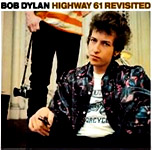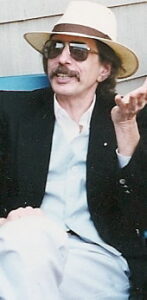Bob Dylan, “Desolation Row,” and A Rat in the Kitchen (Ethiopia)
by Karl Drobnic (Ethiopia 1966-68)
March 31, 2022
•
 Bob Dylan, head slightly cocked, stared at me from the wall of my Peace Corps home, a dirt and wattle hut in a remote Ethiopian village. Highway 61 Revisited flickered, hanging on a thread I’d snaked through the the album cover, glossy in the candlelight of my little house that had no electric, no water, and most of all, no record player.
Bob Dylan, head slightly cocked, stared at me from the wall of my Peace Corps home, a dirt and wattle hut in a remote Ethiopian village. Highway 61 Revisited flickered, hanging on a thread I’d snaked through the the album cover, glossy in the candlelight of my little house that had no electric, no water, and most of all, no record player.
“Stupid situation,” I imagined Dylan saying, an abrupt harmonica wail highlighting the “stupid”.
A friend had gifted me the then-new album while I packed for two years in the African back-country. “Stay in touch,” she said. “Lots is happening in America, too.”
A few days later, I was in my village, two miles up on the high escarpment of southern Abyssinia. Just behind the town, mountains jutted skyward another 4,000 feet, catching fluffy clouds that drifted above thorny acacia trees and packs of shaggy-maned baboons on the long savanna that stretched from the Somali Sea 200 miles away.
Addis Ababa, the capital, was two days away — by horse for several hours to reach the last kilometer of all-weather road, there to catch a truck-taxi to the next town, and then onward in a crowded market bus.
After three months in the village, I made that trip, and discovered a small electronics shop in the Piazza, the bustling square that is a legacy of Mussolini’s invading armies. In the shop’s window, gray, plastic, compact, and Panasonic, was a battery-powered phonograph. Out of my pocket came a month of my meager Peace Corps pay, and into my pack went the record player.
“And you’ll need those,” the shopkeeper said. He pointed to a carton of long, fat D-cell batteries. “Lots and lots of those.”
Back in my village, I pushed six D-cells into the underside of the phonograph, took the album off the wall, and swung the arm gently down onto the vinyl. Electric Dylan exploded into my little living room. I played, replayed, and played again the hurtling images. And that was my music for two years. Especially, “Desolation Row.”
I had a funky chair with flat wooden arms, each wide enough to hold a candle, and two candles were just enough to read by. I’d brought Russian novels, thick books like The Idiot, to occupy my nights. I sat in my bare living room, slowly absorbing Dostoevsky and Tolstoy while Dylan sang from a shadowy tabletop, and the phonograph chewed through batteries. About 9 p.m. the rain began. All day the wall of mountains behind the village captured incoming clouds, and as the temperature on the high plains dropped after sunset, the clouds condensed and let loose. About 10-o-clock, the rat came in.
Rat slipped in through the kitchen floor boards, and I never found exactly where. There wasn’t much in the tiny kitchen — a prep table with a kerosene burner for cooking, a plain set of wooden shelves, and a three gallon bucket, my daily ration of river water. Also, a burlap sack with a hundred pounds of flour sat on the floor, leaned up against the far wall. Nightly in the dim candlelight, Rat scurried for the flour sack, Dylan pumping out of the phonograph, rain dropping in torrents outside my front door. And the discharged D-cells were piling up.
So each night before I settled in to read, I lined up eight or ten of the hefty batteries on the chair arms, behind the candles, and started my album so that its eleven-minute finale, “Desolation Row,” would engage about the time I expected Rat. As the guitar strummed into, “They’re selling postcards of the hanging,” I’d peer out into the dim kitchen, grip a battery, and wait to see Rat’s dark form inch up the tan burlap. And, most nights, by about, “The riot squads are restless, they need somewhere to go,” Rat would be there.
Fling. Thud. Fling. Fling. Thud, thud. I’d send the batteries hurtling across my living room into the kitchen, the projectiles thunking into the flour sack. I’d sing along as Dylan intoned “You’re in the wrong place, my friend, you’d better leave.” And if Rat was still there as Dylan leaned into “Get outta here if you don’t know,” I’d belt out that line, too.
I never hit Rat. He was slow and none too bright, a high altitude rat deprived of oxygen and lucky that my aim was abysmal. After a few thuds, he’d turn back down the sack and disappear into the kitchen gloom as Dylan raced on to the song’s end, “Don’t send me no more letters, no, not unless you send them from Desolation Row.”
Thus passed two years, serving humankind in the daytime, in a daft reality at night. Just before I left my village, I put the worn record back into its album cover and taped the sleeve shut. Then I rode far out into the savanna, to a lone tree far from any hamlet or farm. The tree, revered locally as Sheik Hussein’s Shrine, celebrated a mystical appearance there by Archangel Michael. A green row of spiky cacti was planted around the tree to protect it from grazing animals, and a small stone cairn rose on one side. I slipped between the cactus spines and leaned Highway 61 Revisited against the tree, Dylan, his head slightly cocked, staring back at my village. And then, I rode away.
•
Karl Drobnic (Ethiopia 1966-68) pioneered work in English for specific purposes during the era of large scale technology transfer programs between developed and underdeveloped nations in the latter half of the twentieth century.
Drobnic coedited English for Specific Purposes: Science and Technology in 1978 with Louis and Mary Trimble and co-wrote “Sci Tech” published by Prentice Hall, 1980.
He published the “English for Specific Purposes” newsletter from 1978 to 1980, an internationally acclaimed monthly newsletter that advanced the turn of English as a Second Language teaching methodology from prescriptive to descriptive. His work in the area was cited by the Carter Commission on Foreign Languages and read into the Congressional Record in 1979. Drobnic has published dozens of related articles in journals and professional publications around the world.
Drobnic worked as a consultant to the governments and university systems of Sri Lanka, Pakistan, North Yemen (Sana’a), Nicaragua, Peru, Indonesia, Mexico, and Costa Rica. His later work involved the administration of multi-million dollar grants and contracts for the establishment of large scale projects based on the education models he developed for various governments and universities.
The work applied the principles of linguistic analysis to financial analysis and led to the publication of a nationally recognized investment newsletter “Venture Returns,” from 1990 to 2002. It became a frequently cited source in the national financial press and television business news shows.





Thanks for your wonderful recollections. Peace Corps the life changing experience for many of us.
Hi Steve – Life changing, indeed. Peace Corps is an experience like no other. Those were two years I’ve never regretted.
I, too, had a rat-in-the-kitchen story–with a happier ending.
One night, I heard something moving about under my bedroom floor. This continued for several nights in a row and then one night I heard noises in the kitchen. We suspected a mouse or a tat. So my live-in students and I bought a rat trap, which was available in Asella.
The next night, I heard a loud snap. I shot up from the bed. The trap had caught a big rat by the tail. It was very much alive and scurrying about the kitchen. With the help of my students, we picked up the trap with the rat hanging by his tail and plunged it into a bucket of water. We drowned that sucker in the bucket. Problem solved. It was a lot more efficient that D cell battery ammo.
Hi Randy,
Absolutely more efficient. But chucking batteries was actually entertainment…well, sort of. Glad you got your rat. A couple people from my training group were in Asella. What years were you there?
Hi, Karl. Great story! I started out in the Peace Corps in Botswana (1968-70), too, and developed a love of English teaching. Spent my career in assessing English for specific purposes, mainly at Iowa State University. Admired your work over the years…
Hi Dan,
Glad you liked the tale, and nice to hear from one of the English for Specific Purposes community. We were a small band who had an outsized effect on the course of higher education. From those small beginnings in the 1970s, we now have universities around the world that offer doctorates in ESP. Maybe that fills the PC’s final goal – what do PCVs do with their experiences after they return home?
I loved the essay…every word
My rat story in a mud house in Mettu Ethiopia
Cold winter rains blowing in under the tin roof
Stumbled in the back unlit room to find a sweater
Dig into my trunk and pulled on a sweater
Stumbled back to the kerosene lantern lit room
Clinging to my sweater was a nest of a mother rat and all her babies….now trying to cling to my skin. ……ahhh memories
Hi Pat,
What a way to meet again…sharing rat stories. Some things make a very deep imprint. I like the spare, semi-haiku way you lay down your rat memory. I can hear the shriek you didn’t detail. Was it after “all her babies” or “cling to my skin”?
I admire all the good work you and John have done over all the ensuing years. Please give my regards to the Congressman. I’d vote for him any day.
A quintessential Peace Corps story beautifully written.
Jeanne Paul, Brazil, 1964-66
Hi Jeanne,
Thanks. I’m happy you liked the post. BTW, a friend of mine, named Lee, was a PCV in Brazil about the same time you were. Any Lees in your PC memories?
Great piece!! It reminded me of how when we would open the community center (Guayaquil, Ecuador) at night for a community meeting, before turning on the lights we would loudly stomp out feet to send the rats scurrying. As Jean Garamendi so aptly said…Ahhh memories.
Hi Marnie,
So many times PCVs come back with animal stories, and usually not the cute, cuddly animals! I spent a few weeks in Ecuador when my daughter was a foreign exchange student there, and passed through Guayaquil a couple times. Lovely country. What fantastic soups they have. I brought back an Ecuadorian Soup Recipes book. Mostly I just look at the photos and recollect the tastes.
Glad you got the rat. During my PCV experiences in Honduras and Togo, keep rats and cockroaches at bay was a constant battle. In Togo, this battle was made easier because the people hunted and ate rodents. In Honduras, I always kept a few bottles with a little beer around and the cockroaches would crawl into and then could not escape. When the rats and cockroaches got too bad, I would sleep outside.
Hi Mark,
Rats and cockroaches can mess up any paradise. I used a similar cockroach trap when I worked in Sumatra. I’d pour an inch or two of a sickening sweet local wine into tin cans. The roaches would scurry up the sides, fall into the wine and drown. Peace Corps should publish a survival guide on dealing with such things.